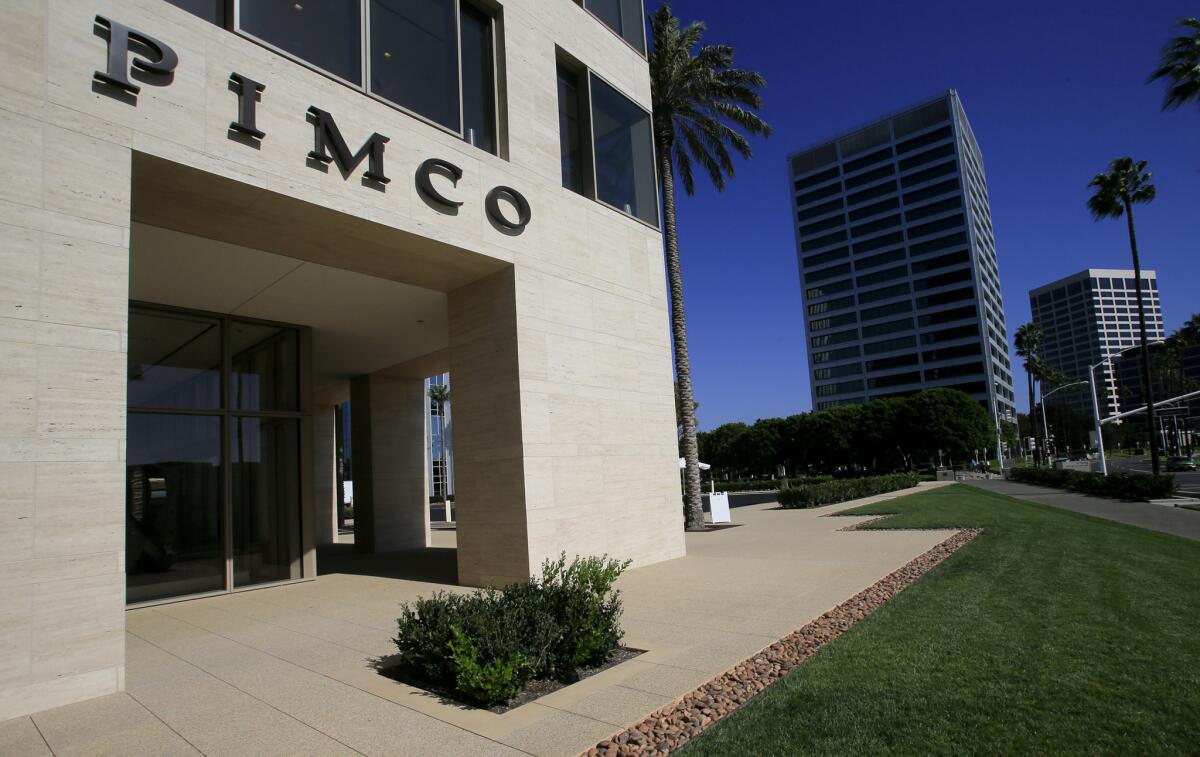Pimco loses more funds to MetWest, other rivals, Morningstar says

Rival bond funds are gaining at the expense of Pimco’s flagship Total Return Fund as it continues to suffer a “staggering” rate of investor defections, according to a new report from investment research firm Morningstar Inc.
Metropolitan West Total Return Fund, a rival fund offered by TCW Corp. in Los Angeles, pulled in more than $4 billion in February and $32.6 billion over the year ended last month.
MetWest Total Return, overseen by Tad Rivelle, TCW’s chief investment officer for fixed income, grew 127% in the year to $60.8 billion under management from $26.7 billion, Morningstar said.
Dodge & Cox Income Fund also was a big gainer from the Newport Beach company’s decline, Morningstar said, adding more than $1 billion in February and $15.8 billion over the year.
The contrast between the sharp inflows to rivals -- and to the broader bond-fund business in general -- was striking compared with continued defections from Pacific Investment Management Co., Morningstar senior analyst Alina Lamy wrote in the report.
Pimco saw investors pull $8.9 billion from Total Return in February and more than $119 billion in the past year. The outflows came even though Total Return outperformed the returns of benchmarks since the abrupt departure of its one-time star manager, William T. Gross, in late September.
“At this point, the longer-term monthly outflows seem to have almost nothing to do with performance and almost everything to do with a phenomenon I would call, to borrow a term from physics, investor inertia,” Lamy wrote about Pimco’s Total Return Fund.
“It’s as if the momentum of past redemptions keeps propelling investors forward in the same direction, irrespective of other forces such as performance, quality of management or overall reputation,” she wrote.
Total Return, which had $124.7 billion under management at the end of February, has seen outflows of more than $168 billion, or more than 57%, since it peaked at $292.9 billion under Gross in April 2013, according to Morningstar data.
Outflows started after months of underperformance under Gross, then spiked when he jumped without warning to rival Janus Capital Management on Sept. 26. Total Return remains one of the largest mutual funds and Pimco one of the largest mutual fund families.
Still, Pimco mutual funds and exchange-traded funds saw more than $172 billion in outflows for the year ended February, with the vast majority from Total Return.
That pulled the family of funds’ total down to $372 billion under management, from $532 billion, and dropped its ranking among mutual fund families to eighth from fourth, Morningstar said. Vanguard Group remained on top, with $246 billion in inflows last year and more than $2.7 trillion in assets.
The fastest growing fund family was MetWest, which saw assets under management grow 106%, according to Morningstar. MetWest remains considerably smaller than top-tier funds, with $69.8 billion under management, most of it in MetWest Total Return, Morningstar said.
Looming behind the competition among actively managed bond funds is rising uncertainty and volatility in the global bond market as investors widely expect the Federal Reserve to begin raising short-term interest rates as early as this summer.
Generally, investors move away from bonds during a time of rising interest rates, which cause bond prices to fall. But investors moved $9.7 billion into actively managed bond funds in September and $18.8 billion more into passively managed bond funds.
“It may be that uncertainty over when rates are going to rise is keeping investors confused,” Lamy said.
Another significant trend in the Morningstar data is the rising popularity of passive funds, both in bonds and stocks, which seek simply to replicate the performance of an index and often outperform actively managed funds by keeping expenses low.
In the last year, $116 billion flowed into passive bond funds, while active funds saw outflows of $16.7 billion. Meanwhile, passive funds holding U.S. stocks posted inflows of $183.5 billion in the year ended last month, while actively managed U.S. stock funds had outflows of $125 billion, Morningstar said.
The biggest beneficiary has been passive-investing pioneer Vanguard, which gained $225.3 billion in inflows to its passive funds last year, including $40.6 billion to its passive Total Stock Market Index fund and $16.3 billion to its Total Bond Market II Index fund.
Another big gainer was New York asset-management giant Blackrock Inc. which gained $96.6 billion in inflows to its passive funds, including its IShares exchange-traded funds unit.
Twitter: @deanstarkman







